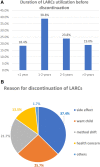Discontinuation of long-acting reversible contraceptive methods and associated factors among reproductive-age women in Shashemene town, Oromia, Ethiopia
- PMID: 38774251
- PMCID: PMC11106469
- DOI: 10.3389/fgwh.2024.1269302
Discontinuation of long-acting reversible contraceptive methods and associated factors among reproductive-age women in Shashemene town, Oromia, Ethiopia
Abstract
Background: The early termination of long-acting reversible contraceptives (LARCs) raises issues for the healthcare system and has the potential to affect public health. Long-acting reversible contraception has now become more widely available and used, although a sizable percentage of women still do not use it. Therefore, this study aims to assess the factors associated with the discontinuation of the LARC method among female users of health facilities in Shashemene town in Oromia, Ethiopia.
Methods: A facility-based cross-sectional study was conducted in Shashemene town involving 410 study participants from nine facilities. The study participants were selected by using a systematic sampling method. The data were collected by using structured interviewer-administered questionnaires, entered into EpiData version 4.6.0.2, and exported to SPSS version 25 for analysis. Bivariate and multivariable logistic regressions were used to examine the association between independent variables and LARC discontinuation. The results were presented using the odds ratio at 95% CI. p < 0.05 was used to indicate statistical significance.
Result: The overall prevalence of women who discontinued the LARC method before the due date was 57.2%. Having an occupation as a housewife, desire for pregnancy, unwarned side effects, effectiveness, and dissatisfaction with the service provided were the factors positively associated with the discontinuation of the contraception.
Conclusion: The prevalence of the discontinuation of LARCs was high. Pre-insertion, effective counseling about the benefits, follow-up care, management of side effects, and client reassurance are recommended.
Keywords: Shashemene town; contraceptive; discontinuation; long-acting contraceptives; reproductive-age women.
© 2024 Letose, Tusa, Sahlu and Miherite.
Conflict of interest statement
The authors declare that the research was conducted in the absence of any commercial or financial relationships that could be construed as a potential conflict of interest.
Figures





Similar articles
-
Magnitude and factors for method discontinuation and switching among long acting reversible contraceptive users in health facilities of Southern Ethiopia.Reprod Health. 2022 Feb 19;19(1):47. doi: 10.1186/s12978-022-01357-2. Reprod Health. 2022. PMID: 35183214 Free PMC article.
-
Unmet need of long-acting and permanent family planning methods among women in the reproductive age group in shashemene town, Oromia region, Ethiopia: a cross sectional study.BMC Womens Health. 2015 Jul 15;15:51. doi: 10.1186/s12905-015-0209-y. BMC Womens Health. 2015. PMID: 26174238 Free PMC article.
-
Discontinuation rate of long-acting reversible contraceptives and associated factors among reproductive-age women in Butajira town, Central Ethiopia.Womens Health (Lond). 2022 Jan-Dec;18:17455057221104656. doi: 10.1177/17455057221104656. Womens Health (Lond). 2022. PMID: 35726769 Free PMC article.
-
Discontinuation of long acting reversible contraceptive use and its determinants among women in Ethiopia: Systematic review and meta-analysis.Front Public Health. 2022 Dec 6;10:979231. doi: 10.3389/fpubh.2022.979231. eCollection 2022. Front Public Health. 2022. PMID: 36561863 Free PMC article.
-
Strategies to improve adherence and continuation of shorter-term hormonal methods of contraception.Cochrane Database Syst Rev. 2019 Apr 23;4(4):CD004317. doi: 10.1002/14651858.CD004317.pub5. Cochrane Database Syst Rev. 2019. PMID: 31013349 Free PMC article.
References
-
- U.S. Department of Health & Human Services, Division of Reproductive Health, National Center for Chronic Disease Prevention and Health Promotion. Available online at: https://www.cdc.gov/reproductivehealth/contraception/unintendedpregnancy... (Accessed March 21, 2023).
-
- World Health Organization. Available online at: https://www.who.int/news/item/25-10-2019-high-rates-of-unintended-pregna... (Accessed March 21, 2023).
-
- USAID. Holistic Approach Enhances Family Planning Programs: Respond’s Experience with the SEED Programming Model. New York: The RESPOND Project (2014). Vol. 27, p. 1–8.
-
- Kolman KB, Hadley SK, Jordahliafrato MA. Long-acting reversible contraception: who, what, when, and how. J Fam Pract. (2015) 64(479):84. - PubMed
LinkOut - more resources
Full Text Sources

